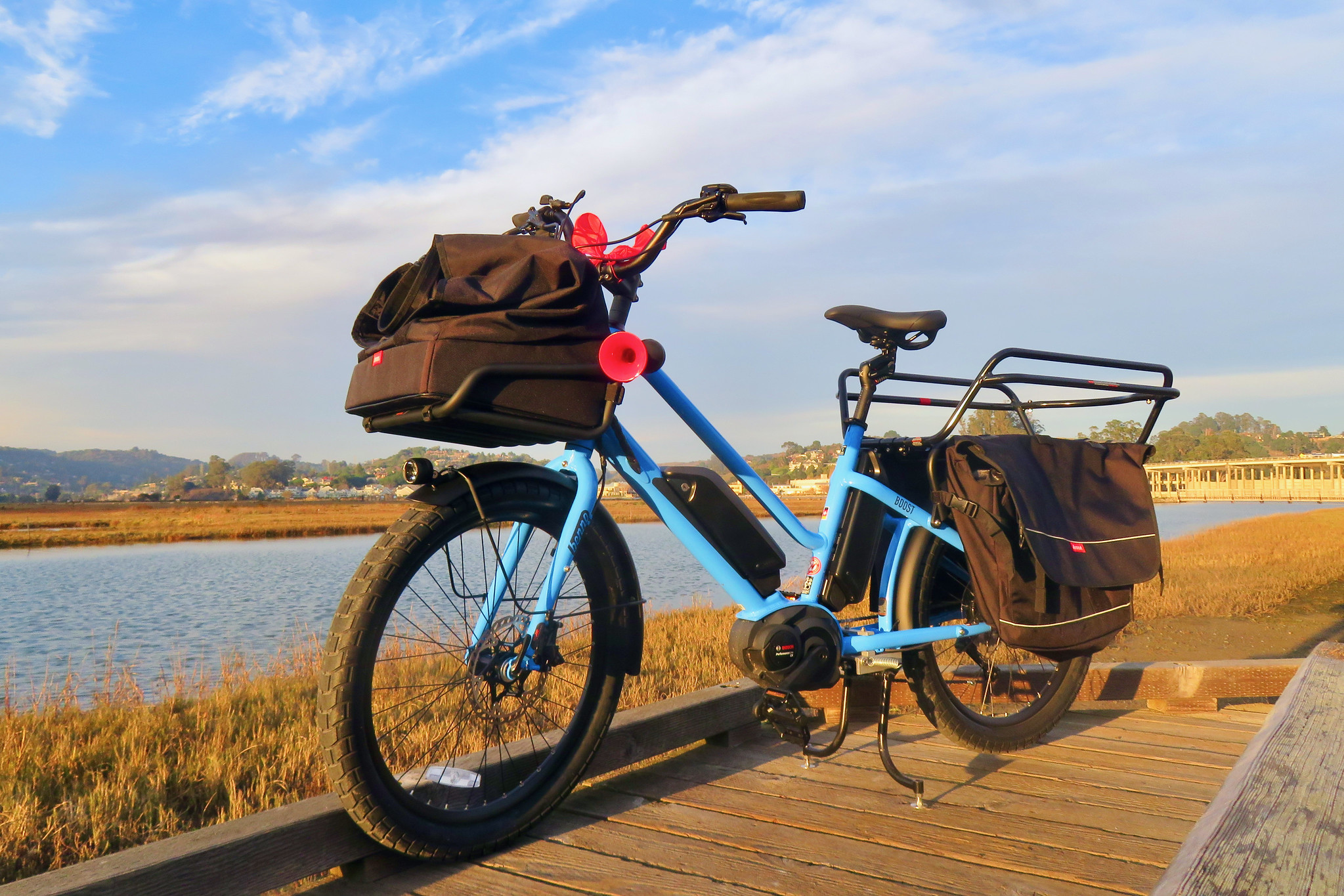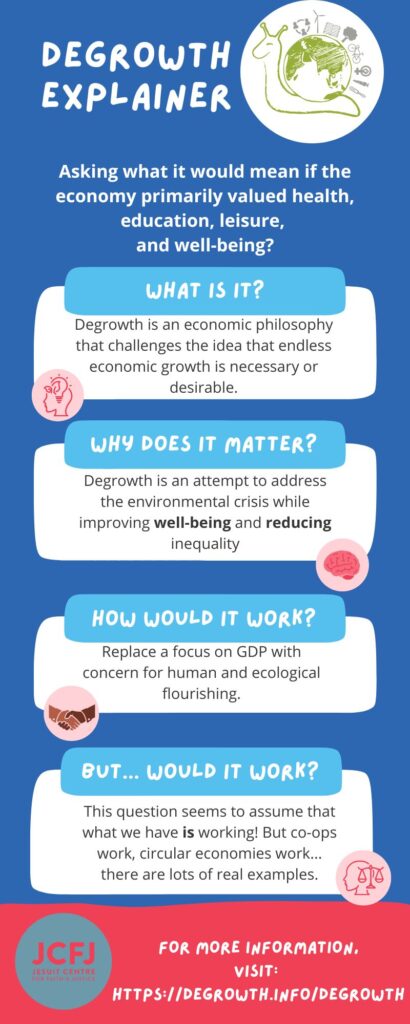
There’s a common trope that we have a name for an entity that seeks to grow without limit (as our variety of capitalism demands) and it is cancer. There’s a deeper, fundamental critique that even anticipating the wonderful gains of efficiency that can come from market competition, infinite growth with finite resources is bound to flounder. And beyond these slogans and abstractions, there is the truth you have to be brave to see: carbon capitalism is corroding the very basis of life on this planet.
Introducing Degrowth
“Degrowth economics” is a response to this civilizational crisis. It is not a silver bullet but we at the JCFJ maintain that it is an interesting and important movement to consider. How can you conceive of economic activity that is productive, but does not assume growth? In our argument about the need for a Green New Deal, we suggest that the State should shift its economic activities towards a degrowth register and leave space for properly private investment to seek growth (which is not a license for yet more tedious middleman-merchanting like landlordism).

Addressing Misconceptions
When you consider how ingrained the idea of “growth = good” is in our shared imagination, it is easy to understand how misconceptions would arise about an idea like degrowth. The movement has been commonly subjected to superficial dismissals. We, in the Jesuit Centre, were astonished once to see one of the academic experts on the topic dressed down quite publicly by a very confident journalist who equated degrowth with recession.
Recessions are obviously bad news. They are especially bad news for the people who are already vulnerable. If that is what degrowth is calling for, it is evidently a risible prospect. But even the most basic engagement with the idea would demonstrate that its proponents have considered this objection and refuted it. Jason Hickel may be the movement’s most prominent public voice and he has articulated how it gets things entirely backwards to equate degrowth with austerity:
- Recessions are not planned and are chaotic. Degrowth is a planned, structured intervention intended to achieve measurable results around ecological impact, inequality, and well-being. They are clearly different kinds of proposals.
- Recessions can be indiscriminate in their effects across sectors. Degrowth is targeted in its approach. It will attend to those economic activities that have a high ecological cost and a low return to wellbeing. So it is not good news if you make ads for SUVs. But much of the activity in our economy is in fact laudable on these terms.
- Recessions cause unemployment. Degrowth, with its focus on care, health, and conviviality, anticipates increased employment.
- Recessions intensify economic inequality. Degrowth seeks to slow and even reverse inequality.
- Recessions lead to austerity and stinging cuts applied to social services. Degrowth aims ultimately at universal basic services.
This looks like a wishlist when it is laid out like that. When one moves suddenly from an idea that sounds awful to the same idea seemingly proffering utopian solutions, you have the same sense of scepticism.
We share that instinct! But it is important, in the face of the polycrisis surrounding us, that we test out the best new ideas and see if they work. And we have a thought-experiment to help you understand how even if degrowth won’t magically deliver gains without costs, it does already have a place to play in our real-world policy commitments.
The E-Bike Downside
When we are asked in the Jesuit Centre for Faith and Justice to explain what theologians mean when they talk about “the common good” we ask people to imagine someone taking up cycling as a mode of transport. There are goods that accrue to them – better health outcomes, reduced transport costs, very often increased transport speed, and the intangible benefit of being in the environment and immersed in your locality. There are goods that accrue to others – reduced healthcare spend, reduced carbon emissions, reduced road maintenance costs, reduced traffic, and one more person is added in the quest for the critical mass of cycle-commuters that makes system change inevitable. But there are also goods that accrue to those who, for whatever reason, could never take the same path. If everyone who could cycle, did cycle, then the roads would be much freer for those who have to drive.
What is the common good? It is “the sum total of social conditions which allow people, either as groups or as individuals, to reach their fulfillment more fully and more easily.” But what does that mean? Consider the social conditions made possible by the new cyclist!
These social conditions are a whole lot easier to achieve now that the e-bike has become the norm. The difference that a good e-bike makes to who can cycle (it legitimately becomes an option for pensioners) and how far they can go (a 15km commute would be a piece of cake) and what they can do (with a cargo bike, the ubiquitous second car is replaced as the bike can carry the kids and the groceries too).
This is not a pipe dream. Cycling is more and more common across Ireland. While sales slumped after the pandemic, that was largely because a saturation point had been reached. Many people (the author included) have already discovered that the vast majority of journeys should begin on a bike.
But what happens if this trajectory continues? Imagine the scenario where 10% of people who currently primarily rely on the private motor car shift to e-bikes. What follows? We get a cascading virtue cycle where the number of people travelling on two wheels is significant enough to make the development of dedicated cycle infrastructure easier, which in turn encourages more people to make the switch. We get a reduced spend in the HSE as heart health increases. We get a reduction in carbon emissions as the bikes need no exhaust. The likelihood is that local businesses would see a significant uptick in their sales, at the cost of large, out-of-town shopping complexes. Air and noise pollution would trend downwards. Traffic would shrink. Journey times across the population would likely shorten and, even more important perhaps, become more predictable. And let’s not forget the tragic but critical concern of safety. In any given year, hundreds of people die in motoring accidents. In the history of the State, one pedestrian has been killed by a cyclist.
This is a win/win/win/win/win/win situation, right?
Well, we did forget to mention one little detail. If 150,000 people became primarily cyclists over the next five years, the impact on the economy could be quite destructive… to GDP. A top of the range bike costs about €8,500. Insurance might cost €200. Servicing costs would rarely top €200. Fuel costs would be based on charging the battery and in the course of the year would be less than a tank of diesel. Across the board, influential sectors in our economy would take a hit. And the calculation at the end of the year would have a negative sign associated with it.
Does this mean it would damage the economy? People would be healthier and enjoy more wellbeing. Small businesses could flourish. Logistics would be more efficient and more predictable. And the spare money from filling up at the petrol station would likely just be spent somewhere else, more productively.
GDP might take a knock, but the economy would be stronger.
And the keen reader will see already what we have tried to display: this is what degrowth looks like. The growth in the cycle retail and service industry could never make up the difference in the reduction suffered by dealerships and mechanics. There would be contraction. But there would not be recession, austerity, or any of the other inevitabilities of our boom/bust fossil capitalism. The economy would get smaller and get stronger.
Maybe these ideas are worth considering…

